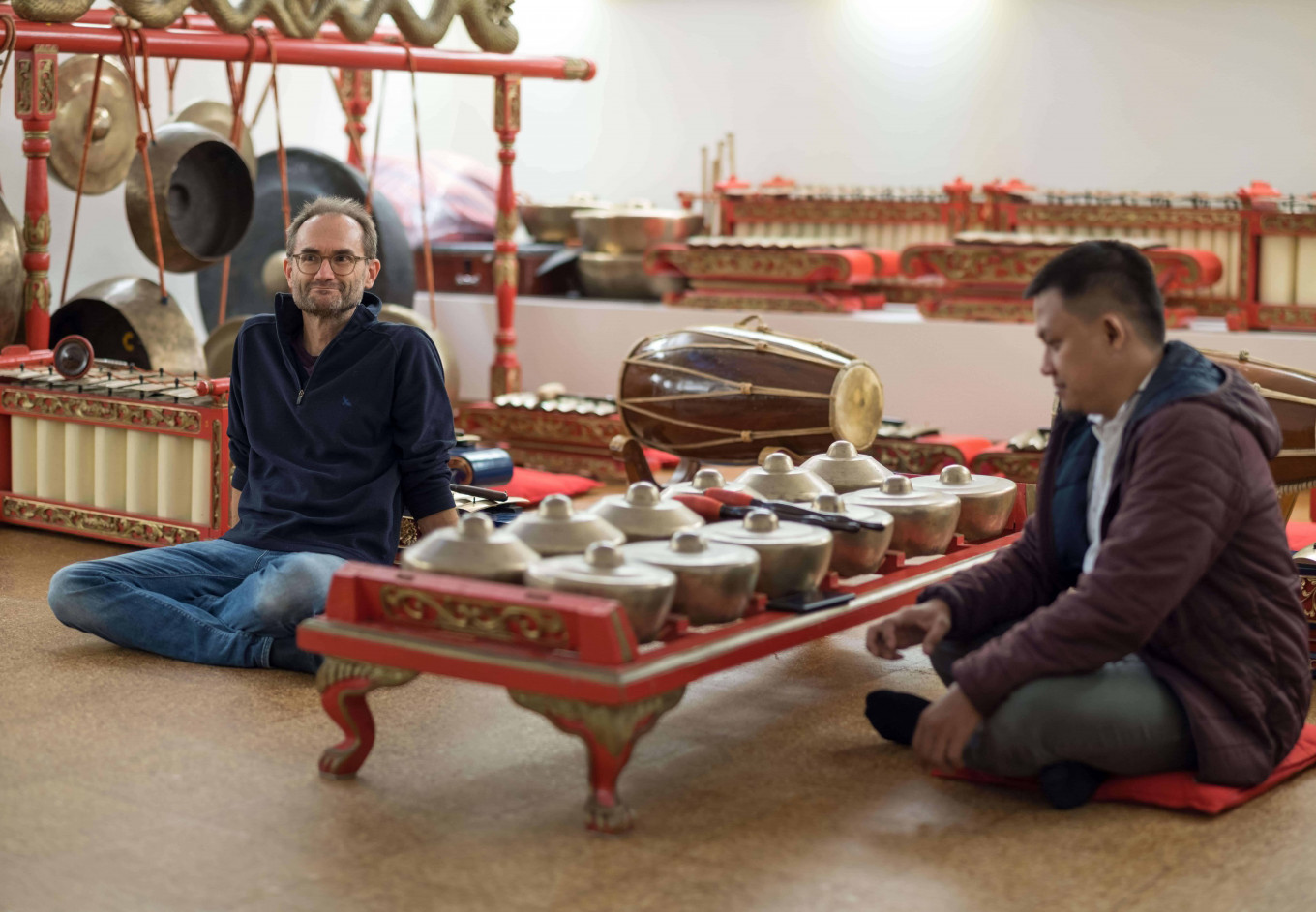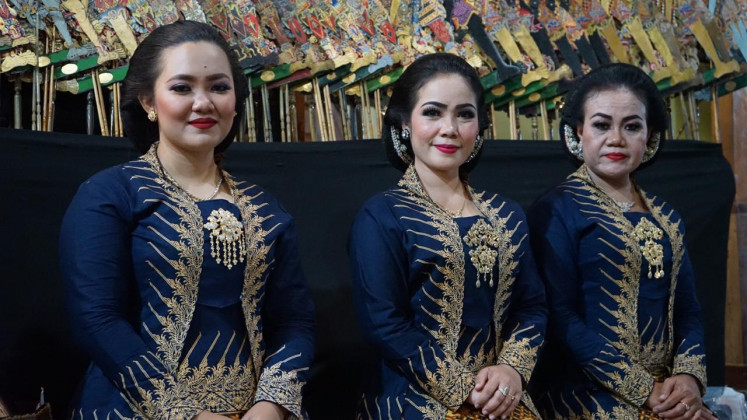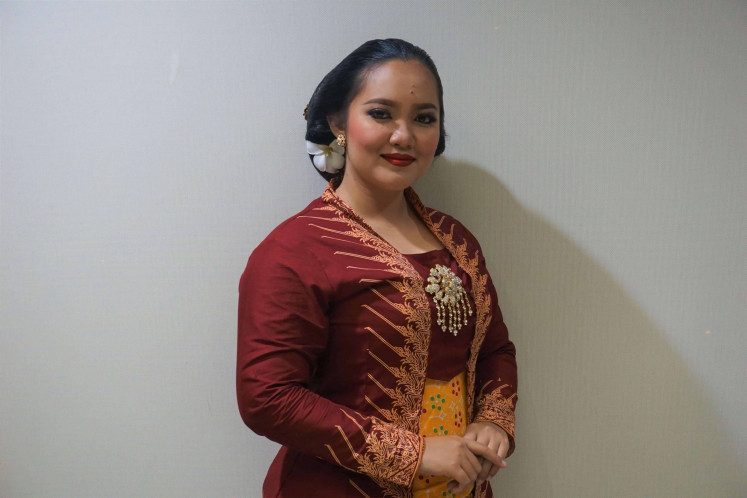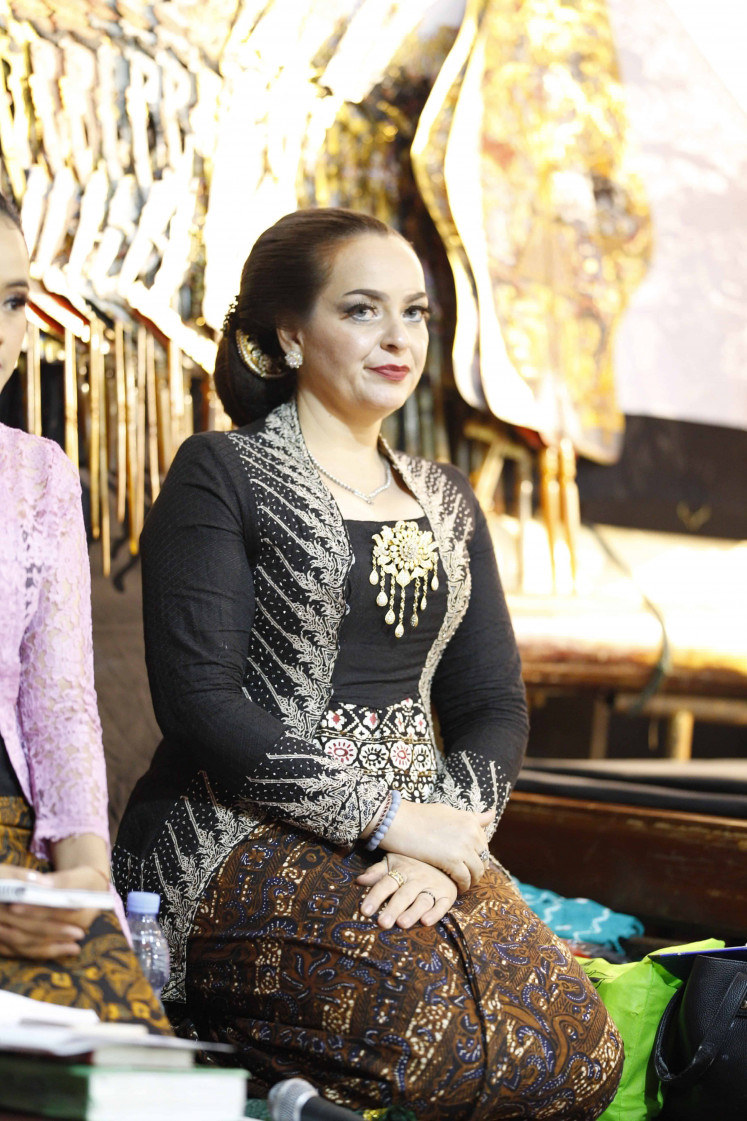Popular Reads
Top Results
Can't find what you're looking for?
View all search resultsPopular Reads
Top Results
Can't find what you're looking for?
View all search resultsSinging on: Next-generation 'sindhen' carry the Javanese performing art
Change text size
Gift Premium Articles
to Anyone
M
usically inclined people, both Indonesians and foreign nationals, are carrying the Javanese traditional performing art over the tide of pop culture into the digital era and hopefully, beyond.
Pesinden, more commonly known in the shortened form sinden, is a female solo singer who performs with a Javanese gamelan troupe, usually to provide the musical accompaniment for traditional dances or a wayang show. They also perform with just their gamelan troupe as klenèngan. Their vocals are mostly improvised within strict melodic parameters, but are relatively free in terms of rhythmic style.
“I knew that becoming a sinden was something I wanted to do since I was a child. I remember I loved to sing classic Javanese songs like ‘Kelinci Ucul’ [and] ‘Meh Rahino’,” said Suci Ofita Dewi, a 28-year-old sinden based in Surakarta, Central Java, who is originally from Tulungagung regency in East Java.
Suci saw the moment when a general interest in sinden started growing among people her age: “When I took a singing class to learn Javanese songs in 2000, I was the youngest one there. It was not that popular among young girls [then]. But by 2007, many younger girls started taking the class.”
Kartika Cahaya Arisanti is a 21-year-old sinden based in Malang who shares Suci’s passion.
“I became interested in sinden when I was 14 years old. It was my teacher who first told me to try it, and I just fell in love with it, said Kartika. “It was a hobby that I would get paid for,” she added, even though her friends referred to her as being “old-fashioned”.
Kartika believes she is contributing to preserving a cultural tradition that most people her age aren’t interested in.
“If it’s not our generation that will preserve it, who else will?” she asked.
Keeping the tradition alive: Suci (L) with her fellow sindhen performers. (Courtesy of Suci Ofita Dewi). (Personal collection/Courtesy of Suci Ofita Dewi)Bagus Baghaskoro, 39-year-old lecturer from the Indonesian Arts Institute, Surakarta (ISI Surakarta), said that one of the challenges to becoming a sinden was regional specificity.
“The profession is actually very intriguing because the vocal style of sinden in East Java is different from sinden in Central Java, because they have different cengkok [melodic styles], but it’s very hard to elaborate on the differences until you have studied it firsthand,” he said.
Bagus explained that becoming a sinden was not easy, and that it could takeup from 10 to 15 years to perfect the vocal techniques. Nevertheless, things had started to change in recent years.
“The sinden profession used to be much more complicated because there used to be only one singer. So sinden needed to be able to sing every Javanese [song], but now they have up to five sinden on every wayang show,” he said.
Lifelong dedication
Suci is committed to her work as sinden. "For me, it's a way of life. I can make a living from it as well. I was able to graduate because I was a sinden. At the same time, being a sinden also gave me appreciation for my own culture,” she said.
Suci had always been interested in the performing arts. And although most members of her family are performers of Javanese traditional arts, they forbade her to become a sinden, as they did not believe it had stable career prospects. She also experienced a similar lack of support from her friends.
Not just a hobby: Suci said that being a sindhen is way of life. (Courtesy of Suci Ofita Dewi). (Personal collection/Courtesy of Suci Ofita Dewi)"I remember I would cry whenever my parents forbade me to perform,” she recalled.
And like Kartika, Suci also encountered prejudice: “Some of my friends laughed at me whenever I performed as a sinden in a show. They thought it was too old-fashioned."
But she persisted, continuing to attend free lessons on her own. Eventually in 2010, she joined the Sanggar Satria Laras troupe headed by Ki Enthus Susmono, the late master wayang maker, and performed with the troupe for eight years.
She also graduated with a bachelor in performing arts and earned a master in Music production, both from ISI Surakarta.
Suci says that the traditional performing art is a good way to learn about Indonesia’s diverse culture.
“There are times when people think negatively about sinden, they [say] that sinden is similar to being an escort. But that’s completely wrong, there are norms and ethics that we have to learn [that] can be applied to my daily life,” she noted. “For example, how I should behave when talking to older people, because most of the puppeteers are much older than I am.”
Foreign interest
Sinden as a traditional performing art of Indonesia has captured the interest of non-Indonesians, including 41-year-old Agnes Serfozo from Hungary.
Serfozo has been a sinden for more than 12 years and says she fell in love with the art form in 2004.
"It was an accident when I fell in love with the Javanese traditional art [as a] 24-year-old and I got scholarship to [ISI Surakarta]," she said, noting that her interest stemmed from an anthropological perspective.
Global appeal: Agnes went to Indonesia for her cultural anthropology studies and fell in love with Javanese culture. (Courtesy of Agnes Serfozo) (Personal collection/Courtesy of Agnes Serfozo)"After that, I joined pedalangan [wayang puppeteer],” said Serfozo. “But since I was not interested in becoming a puppet master or dalang, I chose to be a sinden. One of my teachers praised my voice as being good enough, so I tried. After that, I just fell in love.”
An early challenge for her was to learn the range of Javanese words and the vocal techniques she needed to sing correctly.
Today, Serfozo says she feels empowered and “proud to be a sinden”. Not only were sinden the sole woman in a troupe, but being a sinden also gave her the opportunity to express Javanese cultural values, beauty and behavior.
In 2008, Serfozo married dalang Sastro Ginanjar, who comes from a long line of puppeteers.
"I see that a lot of [the] younger generation have started to forget about their traditional music, but it's beautiful. It has a lot of deeper meaning, especially the spiritual side of it," she said, and that she hoped that the legacy of sinden would be continued.
Suci is of a similar view as regards sinden regeneration.
"It would be such a pity if [none of] the younger generations want to preserve or even promote Javanese culture like sinden,” she said.
“They don't need to be ashamed of being called old-fashioned, since there are many foreigners who have a lot of interest in our culture.”













